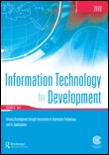
Information Technology for Development
Scope & Guideline
Unlocking Potential Through Technological Insight
Introduction
Aims and Scopes
- ICT4D Research and Applications:
The journal focuses on the application of information and communication technologies (ICT) in development contexts, particularly in low- and middle-income countries, exploring how digital tools can enhance economic opportunities and social equity. - Digital Inclusion and Equity:
A core area of research is the examination of digital inclusion, addressing disparities in access to technology, and its impacts on marginalized communities, including women, indigenous populations, and low-income groups. - Impact of ICT on Economic Growth:
The journal investigates the relationship between ICT adoption and economic development, analyzing how technology can stimulate growth, enhance productivity, and facilitate financial inclusion. - Participatory and Community-Based Approaches:
It emphasizes participatory methods in development research, integrating local knowledge and community involvement to ensure that ICT initiatives are culturally relevant and effective. - Sustainability and ICT:
The journal also explores the role of ICT in promoting sustainable development goals (SDGs), particularly in areas like environmental sustainability, health, and education. - Policy and Governance in ICT:
Another significant focus is on the implications of ICT for governance and policy, examining how digital technologies can improve governance structures, enhance accountability, and support e-government initiatives.
Trending and Emerging
- Digital Financial Inclusion:
There is a significant increase in research dedicated to digital financial services and their role in enhancing financial inclusion, particularly through mobile technology, reflecting the growing importance of fintech in development. - Indigenous Knowledge and Community Empowerment:
Emerging themes emphasize the importance of indigenous knowledge systems in ICT4D, highlighting participatory approaches that empower local communities in development processes. - Intersection of Gender and Technology:
A notable trend involves examining the intersection of gender and technology, focusing on how ICT can empower women and marginalized genders, particularly in contexts of economic development and health. - Sustainable Development Goals (SDGs) and ICT:
There is an increasing focus on the relationship between ICT initiatives and the SDGs, exploring how digital technologies can contribute to achieving these global goals, particularly in health, education, and environmental sustainability. - Data Justice and Ethical Considerations:
Emerging discussions around data justice highlight the ethical implications of ICT use, particularly concerning privacy, surveillance, and the impact of datafication on marginalized communities. - AI and Digital Transformation:
Research is increasingly focusing on the role of artificial intelligence and digital transformation in development, exploring both opportunities and challenges presented by these technologies in various sectors.
Declining or Waning
- Traditional ICT Infrastructure Development:
Research focused on basic ICT infrastructure development, such as internet connectivity and telecommunications, has become less prominent, as the conversation shifts toward more integrated and advanced digital ecosystems. - Generalized Digital Divide Discussions:
While the digital divide remains relevant, discussions have increasingly moved towards nuanced analyses of inclusion and specific barriers faced by marginalized groups, rather than broad discussions of access. - Conventional E-Government Studies:
Studies on traditional e-government frameworks have waned, with more emphasis now placed on participatory governance and citizen engagement through digital platforms. - Static Models of ICT Impact:
There is a noticeable decline in research employing static models to assess ICT impact, as scholars are favoring dynamic, context-sensitive approaches that account for evolving socio-economic factors. - Focus on Standalone Technologies:
Research centered around standalone technologies without consideration of their integration into broader socio-economic contexts is increasingly being replaced by studies that examine the interplay between technology, society, and development.
Similar Journals
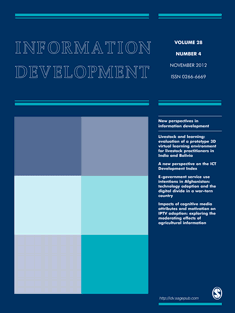
Information Development
Navigating the Evolving Landscape of InformationInformation Development, published by SAGE Publications Ltd, is a prestigious journal focusing on the dynamic intersection of library science and information development. With an ISSN of 0266-6669 and an E-ISSN of 1741-6469, this journal has established itself as a critical resource for researchers, professionals, and scholars in the field since its inception in 1985. With a 2023 Q2 ranking in Library and Information Sciences and a commendable Scopus rank, falling within the 82nd percentile among its peers, the journal provides an invaluable platform for the dissemination of cutting-edge research and innovative practices. Notably positioned in the United Kingdom, the journal offers insightful explorations of contemporary challenges and advancements in information access, management, and policy. Although currently not an Open Access journal, it continues to contribute significantly to its field by fostering a robust academic dialogue and sharing knowledge essential for the evolution of library and information sciences. Scholars and practitioners alike are encouraged to engage with Information Development as it remains instrumental in navigating the complexities of today's information landscape.

Information Communication & Society
Cultivating Scholarly Conversations on Information and CommunicationInformation Communication & Society, published by Routledge Journals, Taylor & Francis Ltd, is a premier journal in the fields of communication and library and information sciences, boasting an impressive impact factor and consistently high rankings in Scopus, including Rank #18/511 in Communication and Rank #14/280 in Library and Information Sciences for 2023. With its focus on the dynamic interplay between information technology and society, the journal serves as a vital platform for researchers, professionals, and students, facilitating the discussion of contemporary issues that shape digital environments. Since its inception in 2001 and converging from 2005 to 2024, the journal has maintained a rigorous peer-review process to ensure that it publishes high-quality research that contributes to ongoing debates and developments in the digital age. Although it does not offer open access, the journal's esteemed reputation and Q1 categorization underscore its impact within the academic community, making it an essential resource for anyone interested in the evolution of communication in the modern world.
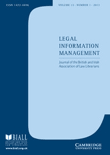
Legal Information Management
Empowering Legal Minds Through Information Mastery.Legal Information Management is a prestigious journal published by Cambridge University Press that serves as an essential resource for professionals, researchers, and students engaged in the dynamic field of legal studies. With a focus on the intersection of law and information management, this journal provides a platform for exploring contemporary issues, best practices, and innovative solutions related to the management of legal information and resources. Although it does not currently offer Open Access options, its rigorous peer-review process ensures the publication of high-quality research that significantly impacts legal education and practice. With its strong academic reputation and commitment to advancing knowledge in legal information management, this journal is crucial for anyone looking to stay updated on critical developments in the field. Located in Cambridge, England, this journal continues to strive towards enhancing the accessibility and understanding of legal information structures globally.
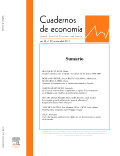
Cuadernos de Economia-Spain
Fostering scholarly dialogue on emerging economic issues.Cuadernos de Economia-Spain, a prestigious journal published by the ASOC CUADERNOS ECONOMIA, DEPT ECONOMIC ANALYSIS, has established itself as a valuable resource in the field of economics, econometrics, and finance since its inception in 1978. With a strong focus on disseminating innovative research and analysis, this journal boasts an impressive Scopus rank of #58 out of 288 in its category, placing it within the 80th percentile of its field. The journal, located in Madrid, Spain, serves as a vital platform for scholars and practitioners to explore contemporary and emerging economic issues, contributing significantly to the academic discourse. Operating under a Q2 quartile classification for 2023, Cuadernos de Economia is particularly well-regarded for its rigorous peer-review process and commitment to high academic standards. Although it adheres to a traditional subscription model, the journal's influence continues to extend across various research communities, making it an essential reference point for those seeking to delve into the complexities of economic analysis and policy.
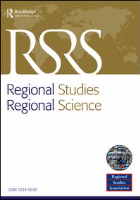
Regional Studies Regional Science
Advancing Knowledge in Regional InteractionsRegional Studies Regional Science is a pioneering journal published by Routledge Journals, Taylor & Francis Ltd, specializing in the interdisciplinary examination of regional dynamics and their effects on economic, social, and environmental landscapes. Established as an open-access journal since 2014, it ensures widespread dissemination of knowledge, promoting accessibility for researchers, professionals, and students alike. Based in the United Kingdom, this journal has garnered a notable reputation, holding a Category Quartile ranking of Q2 in 2023 across various fields, including Economics and Econometrics, Geography, Planning and Development, and Sociology and Political Science. Its rankings in the Scopus database reflect its growing influence within the social sciences, positioning it as a valuable resource for contemporary regional studies. With a commitment to high-quality research, Regional Studies Regional Science serves as a vital platform for the exchange of innovative ideas and empirical findings that address the pressing challenges faced by regions worldwide.

Financial Internet Quarterly
Transforming Ideas into Solutions for Tomorrow's FinanceFinancial Internet Quarterly is an esteemed journal published by WALTER DE GRUYTER GMBH, specializing in the dynamic intersection of finance and digital technology. Since its inception in 2015 as an Open Access journal, it has aimed to disseminate pioneering research, innovative methodologies, and critical analyses pertaining to the financial internet landscape. By addressing contemporary issues in digital finance, cybersecurity, fintech solutions, and blockchain applications, the journal seeks to provide invaluable insights for researchers, policymakers, and practitioners alike. Located in Berlin, Germany, Financial Internet Quarterly fosters collaboration among scholars and industry leaders to advance knowledge in this rapidly evolving field, making it an essential resource for anyone interested in the future of finance.
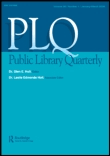
Public Library Quarterly
Transforming information access for a better tomorrow.Public Library Quarterly, published by Routledge Journals, Taylor & Francis Ltd, is a premier scholarly journal dedicated to advancing the field of Library and Information Sciences. With an impressive impact factor and a distinguished ranking of Q1 in its category for 2023, this journal serves as a vital resource for both researchers and practitioners. Since its inception in 1979, it has explored the evolving role of public libraries in society, integrating contemporary research with practical insights. The journal is indexed in Scopus, ranking #69 out of 280 in the Library and Information Sciences category, placing it in the 75th percentile among its peers. Although it is not Open Access, the journal offers a wealth of knowledge on essential topics such as library management, community engagement, and information access, making it an indispensable tool for students, professionals, and scholars alike. Join a global community seeking to enhance public library services and contribute to the discourse on information accessibility and literacy in today's fast-changing landscape.

Small Enterprise Research
Empowering Scholars to Shape Small Business StrategiesSmall Enterprise Research is a distinguished journal published by Routledge Journals, Taylor & Francis Ltd, focusing on the multifaceted aspects of small enterprises and entrepreneurship. With an ISSN of 1321-5906 and E-ISSN 1175-0979, this journal serves as an essential resource for scholars and practitioners interested in the dynamics of small business development, management strategies, and economic impacts. The journal is recognized within the Q2 category across multiple disciplines, including Business and International Management, Development, and Strategy, evidencing its significant contribution to the field. Currently covering extensive research from the years 1992 to 2024, Small Enterprise Research is indexed in Scopus, highlighting its robust academic standing, with notable ranks in various categories. Although it is not an open access journal, researchers will find value in its curated research articles, theoretical frameworks, and empirical studies that advance understanding and practice in small business sectors. As a vital conduit for innovative research and ideas, Small Enterprise Research seeks to foster scholarly dialogue and stimulate development in entrepreneurship and small enterprise management.

Journal of Global Information Technology Management
Advancing Knowledge, Driving Innovation.Welcome to the Journal of Global Information Technology Management, a premier academic publication committed to advancing the field of information technology management since its inception in 1998. Published by Taylor & Francis Inc in the United Kingdom, this journal provides a critical forum for the dissemination of innovative research and practical insights at the intersection of information systems and management. With an impressive impact factor reflective of its influence, the journal currently holds Q2 status in both E-learning and Information Systems categories as of 2023, demonstrating its pivotal role in shaping discussions in these rapidly evolving areas. Featuring a diverse range of studies, the journal offers researchers, professionals, and students alike unparalleled access to high-quality articles that address global challenges and emergent trends in technology management. Dive into the latest findings and contribute to the ongoing dialogue in this vital domain, as we continue to explore the profound impacts of information technology on organizations and society worldwide.

LAW LIBRARY JOURNAL
Advancing legal research through innovative library practices.Law Library Journal, published by the American Association of Law Libraries, serves as a pivotal resource for academics, practitioners, and students in the fields of law and library science. With an ISSN of 0023-9283 and an e-ISSN of 0023-9283, this esteemed journal examines the dynamic interplay between legal scholarship and library practices, ultimately contributing to the enhancement of legal research methodologies. The journal, which has been in circulation since 1978, spans comprehensive topics relevant to law libraries, legal information management, and the evolving role of digital resources in legal research. Although currently not an Open Access publication, its scholarly contributions are critical, as evidenced by its placement in the Q3 quartile in both the Law and Library & Information Sciences categories for 2023. Notably, its rankings in Scopus—765th out of 1025 in Law and 224th out of 280 in Library and Information Sciences—demonstrate its commitment to maintaining rigorous academic standards while addressing the practical needs of legal information professionals. Whether you are conducting research or looking to stay informed about the latest trends in law librarianship, the Law Library Journal remains an essential reference for the evolving landscape of legal practice and information science.